
Related
We look at Israel’s threats to launch retaliatory strikes against Iran as fears grow of a broader regional war. We speak to analyst Trita Parsi, executive vice president of the Quincy Institute for Responsible Statecraft, about the Biden administration sending U.S. troops and the top-of-the-line THAAD missile defense system to Israel. “There are no direct and clear U.S. interests at stake here,” says Parsi. “Every time Israel escalates the war, Biden rushes in to protect Israel from the consequences of its own escalation,” incentivizing Israel’s escalation of tensions in the region and risking drawing the U.S. into war with Iran, he adds.
Transcript
NERMEEN SHAIKH: This is Democracy Now!, democracynow.org, The War and Peace Report. I’m Nermeen Shaikh in New York, with Amy Goodman in Washington, D.C.
We end today’s show looking at the rising risk of a broader regional war in the Middle East. The Pentagon has announced U.S. B-2 bombers attacked five Houthi targets in Yemen earlier today. Defense Secretary Lloyd Austin said the attacks came in response to Houthi’s, quote, “destabilizing behavior.” Houthi fighters have attacked vessels in the Red Sea and the Gulf of Aden since November and vowed to continue until Israel ends its assault on Gaza and Lebanon.
This comes as the Biden administration is deploying an advanced anti-missile defense system and a hundred U.S. troops to Israel as Israel threatens to carry out retaliatory strikes against Iran in response to Iran’s recent ballistic missile attack on Israeli military and security sites.
Earlier today, the commander of Iran’s elite Revolutionary Guards issued a new warning to Israel. The commander, Hossein Salami, was speaking at the funeral of Brigadier General Abbas Nilforoushan, who was killed in the Israeli attack that killed Hezbollah leader Hassan Nasrallah.
HOSSEIN SALAMI: [translated] You, Israel, may imagine that THAADs can compensate for your shortcomings in defending you. This is a mistake. Do not trust the tubes of these launchers. You cannot massacre Muslim nations but remain safe, secure and live in peace. No, that cannot happen.
NERMEEN SHAIKH: We’re joined now by Trita Parsi, executive vice president of the Quincy Institute for Responsible Statecraft. He’s the author of several books, including Losing an Enemy: Obama, Iran, and the Triumph of Diplomacy.
Welcome back to Democracy Now!, Trita. If you could just begin by responding to this latest news?
TRITA PARSI: So, I think it’s extremely important for the American public to understand that what Biden has done here is that he has deployed U.S. troops into an active war zone in another country’s war. There are no direct and clear U.S. interests at stake here. And the Biden administration is essentially presenting this as if it is defending Israel or helping Israel defend itself, whereas, in reality, these are — the distinction between defensive and offensive weapons here is rather irrelevant, because what the Biden administration is doing is reducing the costs for Israel to escalate tensions in the region. Every time Biden does this, it makes it easier for Israel to escalate. And as a result, it has continued to do exactly that.
If Biden was not reducing the costs of escalation, it would have been costlier for Israel to do the steady escalation as we’ve seen in the last year, a widening of the war, and it would have thought twice. Perhaps the costs would even have been prohibitive. So, if the Biden administration’s actual goal is to prevent the widening of the war, prevent escalation in the region, adding defensive or any type of military capabilities to the side that actually is leading the escalation is not something that, in any way, shape or form, actually can help calm the situation down. Instead, it actually helps fuel tensions in the region and increases the likelihood of the very same widening of the war that Biden claims that he is against.
AMY GOODMAN: Can you give us, Trita, a chronology of what happened? The bombing on the inauguration of the new president by Israel of Tehran — not clear if it was an airstrike, if it was a bomb that was planted — that killed the Hamas negotiator, Ismail Haniyeh, then — that was Israel. Iran waits weeks and then attacks with 180 anti-ballistic missiles that kill no one but a Palestinian who died from, not clear, the shrapnel that came down from the sky in Jericho. They said they were just targeting military sites in Israel. Is Iran coordinating, by the way, with the United States, actually, in all of this? Is there more behind-the-scenes communication than we understand?
TRITA PARSI: There is behind-the-scenes communication, undoubtedly. And there is, perhaps at a surfical level, a degree of coordination. I think the Iranians do not want to see escalation, knowing very well that they are in a weaker military position, and they know quite well that Netanyahu has been looking, itching for a war for quite some time, a war that he designs to drag the U.S. into it. And his best opportunity to drag the U.S. into this unnecessary war is in the next three weeks. So, the Iranians have been rather restrained, hoping that they would avoid walking into Israel’s trap.
This is part of the reason why, after the assassination of Haniyeh, despite the fact that they promised a response, they didn’t respond. They claim that there were promises from the U.S. and Europe that there would be a ceasefire and that they waited to give that a chance. No ceasefire came, but on top of that, instead, Israel attacks Lebanon, kills Nasrallah, as well as the senior IRGC official. And after that, the Iranians did decide to respond, and they do so by striking military targets.
And in that strike, they also demonstrate their capacity to penetrate Israel’s air defenses, which is precisely why, when the THAAD is now being deployed over there in Israel — is an indication, is an admission that the Israeli air defenses are insufficient. This, again, goes back to what I said earlier on. Every time Israel escalates the war, Biden rushes in to protect Israel from the consequences of its own escalation. That is not a strategy to prevent escalation; that is a strategy that fuels escalation.
NERMEEN SHAIKH: So, Trita, could we also talk about what role countries in the region could potentially play in any possible retaliation against Iran? The Iranian foreign minister was recently in Riyadh. He’s now in Egypt. But people have spoken specifically about Saudi Arabia and the United Arab Emirates. Israel has been trying to persuade them to, quote, “not facilitate any possible Israeli retaliation.” If you could talk about the relationship between the UAE, Saudi Arabia and Iran, the various sites at which they’ve been at odds, and where they stand at the moment vis-à-vis Iran?
TRITA PARSI: There’s been an interesting evolution of the position of the Saudis and the Emiratis. Fifteen years ago, they were not publicly, but privately, they were lobbying the U.S. quite aggressively to go to war with Iran. This was revealed by the WikiLeaks, in which the cables showed how much very senior officials, including the king of Saudi Arabia at the time, was pushing for the U.S. to go to war. This has now changed in the last couple of years. There’s both been a bit of a rapprochement between these countries, but also a clear realization on the Saudi and the Emirati side that the Iranians actually have capabilities that go far beyond what they had expected, which means that in case of a war, the Iranians would have the capacity of destroying a tremendous amount of facilities in Saudi Arabia and the Emirates, and as a result, those two countries would suffer tremendously in the case of a war, which is something that they previously did not think was the case.
Today, I don’t think they are, in any way, shape or form, eager for this type of a confrontation. And I think the message from the Iranian side to them has been that if they facilitate, if they allow their airspace to be used or their bases to be used for an attack against Iran, the Iranians will also retaliate against them directly. I think that message from the Iranians is sent to them in order for them to put pressure on the Biden administration to actually restrain Israel, something that the Biden administration has been unwilling to do. The Iranians don’t have a direct way of pressuring the Biden administration, but they appear to be calculating that through Saudi Arabia and the UAE, there may be a greater likelihood that the Biden administration finally will do something to prevent the Israelis from further escalation.
AMY GOODMAN: Trita Parsi, according to The Washington Post, Israel is now considering striking military sites in Iran, but not Iran’s oil or nuclear facilities. However, many in the U.S. and Israel are saying, “Take this moment to strike. Take out Iran’s nuclear facilities.” We know, of course, Trump pulled the U.S. out of the Iran nuclear deal that Obama had negotiated. What exactly would this mean, what is about to take place, apparently?
TRITA PARSI: Most military analyses point to the fact that the Israelis actually don’t have the capacity of delivering a fatal blow to Iran’s nuclear facilities. They have been pushing for a larger attack, including against oil installations and economic infrastructure. The Biden administration has pushed back and has essentially delivered a list of military targets that they believe would be adequate for Israel’s response. The Israelis, reportedly, have agreed to this.
But I think it’s very important to understand that most of this is, frankly, meaningless, because once the Israelis strike, particularly if they strike against military sites and try to target military officials, as they have done in Lebanon, there will be civilian casualties. There will be an escalation, that will almost make it inevitable for the Iranians to then respond again, which then means that in the second iteration of this, the Israelis are very likely to go after economic infrastructure, oil installations, and potentially the nuclear program, as well. As long as we are on an escalatory cycle, it does not matter what the first step is. What matters is what the last step is. And as long as we are on that cycle and Biden is not preventing it, it’s, frankly, meaningless if the first step is to avoid targeting nuclear sites and economic infrastructure. This will escalate towards a war in which all of those different things will be targeted, both on the Iranian side, as well as on the Israeli side.
NERMEEN SHAIKH: And, Trita, finally, if you could talk about, respond to the fact that Netanyahu, much like — we spoke about this in our earlier segment on Lebanon — much like as he did with Lebanon, gave a direct address to the Lebanese people? He did the same with Iran last month, saying, “With every passing moment, the Iranian government is bringing the noble Persian people closer to the abyss.” What is the significance of this, and why is he doing that?
TRITA PARSI: Well, he’s done this on previous occasions, as well, not only in the context of Gaza and Lebanon, but in the case of Iran, as well. I think the primary target of this is actually not the Iranian public. The message was in English, and the original video had English subtitles. This is a message to the Western audience in order to present Israel’s war of aggression as a defensive war, as a war that will help get rid of a very unpopular regime in Iran, and as a result, just as with the Iraq War, this deserves the support of the Western publics, because the government in Iran is so problematic, similar to the argument against Saddam Hussein. And remember, it was Netanyahu who testified in Congress back right before the Iraq War promising that an attack on Iraq would have positive reverberations throughout the entire region.
NERMEEN SHAIKH: Thank you, Trita Parsi.
TRITA PARSI: We’re seeing again the Israelis —
NERMEEN SHAIKH: I’m afraid we’re going to have to leave it there. Trita Parsi, executive vice president of the Quincy Institute for Responsible Statecraft and author of several books, including Losing an Enemy: Obama, Iran, and the Triumph of Diplomacy. And that does it for our show. I’m Nermeen Shaikh, with Amy Goodman, for another edition of Democracy Now!

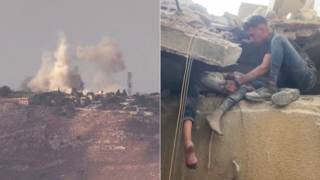

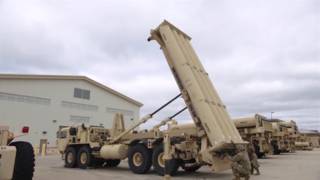



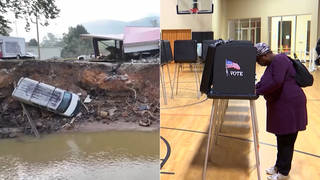
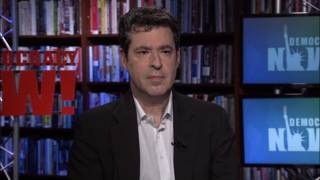

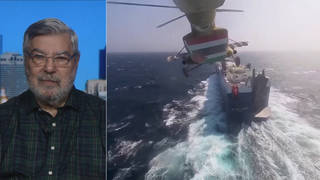


Media Options